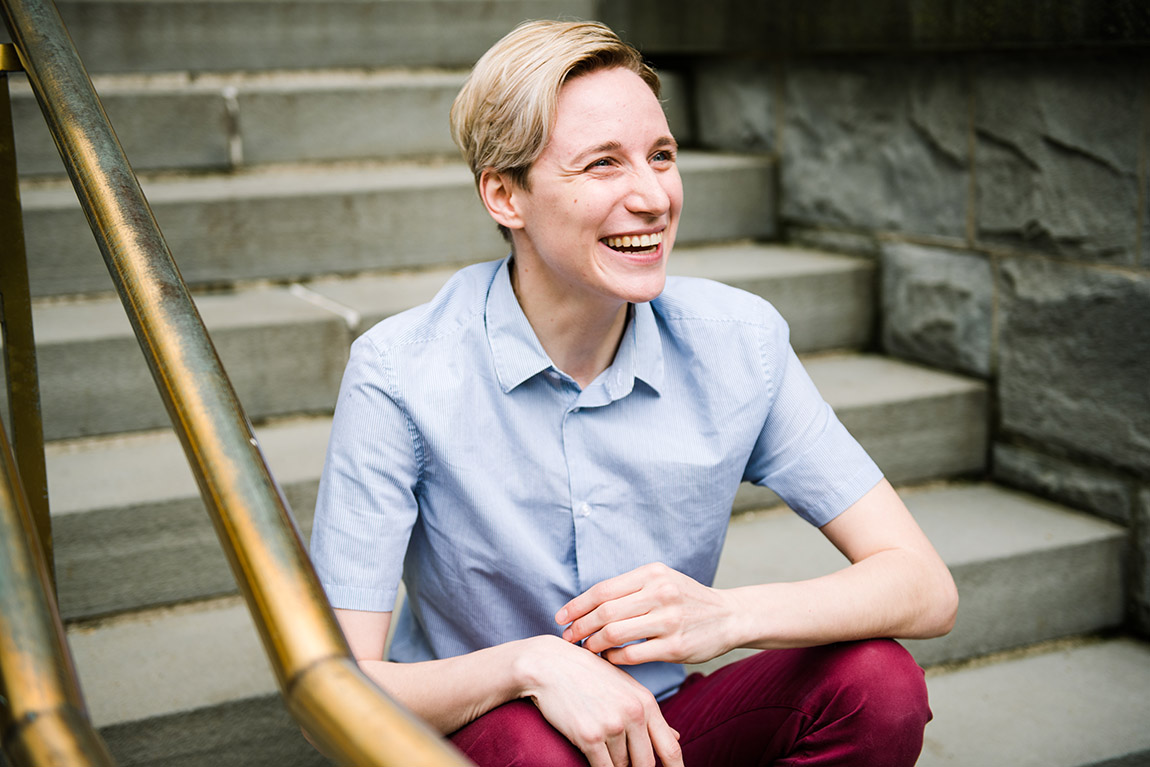Personally Speaking: Mel Ferrara
Mel Ferrara ’15 is a Ph.D. candidate and adjunct professor who lives in Philadelphia, Pennsylvania.
Personally Speaking is a feature of Muhlenberg Magazine where our writers interview students and alumni about their own personal story. This article was originally published in the Summer 2019 issue of Muhlenberg Magazine. Photos by Maggie Ewald.
They are in the Ph.D. program in gender and women’s studies at the University of Arizona.
I recently completed the fourth year of my doctorate program at the University of Arizona. I went directly from Muhlenberg into graduate studies with Arizona because of their trans studies program—it’s the only one of its kind in the country. My research is situated within trans and intersex studies and feminist science and technology studies, and my dissertation looks at the experience of folks who have been diagnosed with Klinefelter syndrome—a genetic condition where an extra copy of the X chromosome is present and often goes undiagnosed until adulthood, when some patients seek fertility assistance—and healthcare practices surrounding the diagnosis.
Their path to Muhlenberg started with a visit to the neuroscience department’s Brain Camp…
I heard about Muhlenberg from my childhood pediatrician, an alum. My mom had mentioned I was interested in neuroscience and premed and was told, “Muhlenberg is where I went! You should check it out!” We found out about Brain Camp, and I thought, “I went to history camp last year—why not go to neuroscience camp? I’m a nerd!” So I went and I loved it. When I was applying to colleges, I realized I was comparing them all to Muhlenberg. At the time I hadn’t envisioned it as a top choice, but one day when my mom and I were back walking around campus we realized, “I can go here!”
...but conversations with professors quickly had them exploring different academic interests.
Professor Brian Mello was my advisor for my Dana Scholar First-Year Seminar. I walked into his office for our initial meeting, and he thought I planned to major in philosophy/political thought. I said, “No, no. I’m neuroscience and premed,” but he was convinced I would change my mind. I figured he must not have known what he was talking about. But by my second semester I had taken Philosophy of Feminism with Professor Marcia Morgan...and fell in love with it. As someone who is queer and trans, exposure to feminist theory was a radical moment for me where I could finally put language to the experiences that I had been having. I realized that I was deeply interested in philosophy and studying science and medicine from a historical and social perspective.
Muhlenberg became a place where they were drawn to causes and communities.
At Muhlenberg, I got involved with Students for Queer Advocacy and the Feminist Collective right away. I soon took on leadership roles and co-founded the Muhlenberg Trans Advocacy Coalition the summer after my junior year. It was a notable moment in time for diversity work on campus. I got involved with the Diversity Vanguard, and we came up with a list of demands for President Helm about changes needed on campus. That resulted in the development of the College’s Diversity Strategic Plan.

They are a scholar with the Point Foundation, the nation’s largest scholarship-granting organization for LGBTQI+ (lesbian, gay, bisexual, transgender, queer and intersex) students.
The Point Foundation provided me with a sense of community and a hyper-supportive environment that helped me acknowledge just how little confidence I had been having in my work and push back against that in a really beautiful way. In one of my service projects with Point, I developed a training program for healthcare providers who work with LGBTQI+ patients. The training challenges medicine’s empirical foundation: objective, clear-cut answers to problems. They might need to use different language and approaches to talk about healthcare with me and other LGBTQI+ folks.
Mentorship, including teaching undergraduates, has become an important part of their life.
I’m excited to be teaching at this particular moment. I have students who, in intro-level classes, have already engaged in social justice work or who are seeing this language for the first time. The work that I do is something I am deeply passionate about, but it can also be very exhausting. Teaching undergraduate students and witnessing the energy they bring to these issues keeps me feeling enthusiastic.
